* You are viewing Posts Tagged ‘Digitization’
James Brown
November 26, 2012
Conferences and Workshops, Events, Project Updates, Projects and Centres, Videos, Websites and Databases
Tags: AHRC, Databases, Digitization, Union Catalogue, Visualization
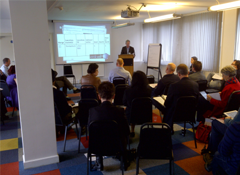
Howard mid-‘yack’
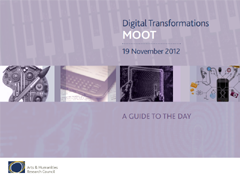
Visit event website
An outing to London last Monday when we presented Early Modern Letters Online at the Digital Transformations Moot, curated and funded by the AHRC. The day long event brought together digital humanists with thinkers and practitioners from other disciplines and sectors ‘to explore the possibilities of the Digital Transformations theme for new and exciting ways of working: to hack, to make, to break’.
The Moot did a great job of showcasing the very wide range of work (and attendant debates) currently being done at the intersection of the humanities and the technical, and in particular in highlighting and fostering new kinds of connections between digital technologies, arts and the humanities, and the creative and cultural industries (the latter being much more strongly represented than is usual at DH gatherings). It was also really interesting from the perspective of event design. Decked out in bracing, challenging terminology – debates were ‘moots’; delegates were ‘mootlings’; papers became ‘yacks’ – the day spread keynote lectures, panel discussions, software demos, and PechaKucha-style talks across multiple tracks and spaces in a kind of freeform digital smörgåsbord that rewarded curiosity and encouraged the creation of individual narratives and serendipitous connections between the sampled components. Further details on the Moot webpage, while the Twitter hashtag was #digitrans; videos of the various live streams will be posted the the webpage shortly.
A leading journal in early modern studies, focusing in particular on close textual analyses of fresh sources and innovative interdisciplinary approaches, The Seventeenth Century is published four times per year. During the reception, over eighty delegates and guests assembled in the modern and airy senior common room and terrace of the Faculty of English to toast this new relationship over sparkling wine and delicious canapés provided by the Organic Deli Café. We were also treated to short speeches from Professor Richard Maber, General Editor of the journal and speaker at the conference, and Adam Burbage, Managing Editor at Routledge. In moves close to the Project’s heart, both described plans to increase the journal’s online presence, including the digitization of all back issues, full-colour publication online, a new digital submission and refereeing system for prospective authors, and a new journal website on Routledge’s cutting-edge platform.
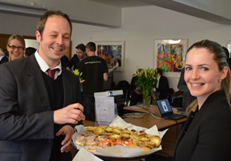
Adam Burbage from Routledge samples some canapés
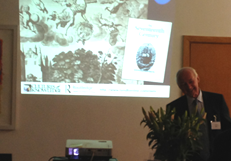
General Editor Richard Maber describes the new partnership
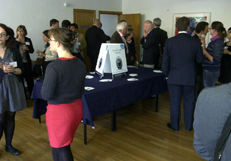
Guests circulate around the Routledge display table
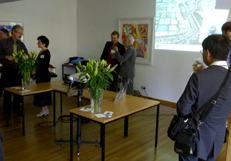
Lilies, celebratory slides, sparkling wine, sparkling conversation
We congratulate Richard as well as Adam, Mark, Andrea, Rachel, and Louise from Routledge (and thank them for their help with and generous sponsorship of the reception), and wish The Seventeenth Century every success in its new home! Stay tuned to developments on the publisher’s website.
James Brown
August 29, 2012
Projects and Centres, Websites and Databases
Tags: CKCC, Databases, Digitization, Dutch Republic, History of Scholarship, History of Science, Networks, Seventeenth Century, Visualization
Our good friends and colleagues from Circulation of Knowledge and Learned Practices in the Seventeenth-Century Dutch Republic (CKCC) at Huygens ING in The Hague have a shiny new website. Most excitingly, the revamped site contains a link and extensive supporting documentation for a closed beta (or prototype) of the much-anticipated Epistolarium, a virtual research environment in which users can explore and analyze metadata and full texts of c.20,000 scholarly Dutch letters from the period 1594-1707; see the video above for a rapid-fire introduction. As a long-standing collaborator of CKCC, we’ve been fortunate enough to get a sneak preview of this exciting new resource and will be providing feedback in advance of a full public release (and a resulting edited collection) in 2013. Congratulations to Charles, Guido, Walter, Wijnand, and the rest of the CKCC team!
James Brown
June 12, 2012
Events, Lectures, Podcasts, Project Updates, Websites and Databases
Tags: Digitization, Editions, Electronic Enlightenment, France, Mapping the Republic of Letters, Networks, Text Mining, Visualization
 Podcast available on the seminar page!
Podcast available on the seminar page!
In the fourth paper of our seminar series on Thursday 17 May, Dr Glenn Roe – formerly of the University of Chicago, and current Mellon Fellow in Digital Humanities at Oxford’s OERC – gave a sophisticated and suggestive paper on ‘Text-Mining Electronic Enlightenment: Influence and Intertextuality in the Eighteenth-Century Republic of Letters’.
.
Building on his recent work with the Electronic Enlightenment corpus and other online repositories of long-form historical text, Glenn started his talk by observing the irony that the recent efflorescence of big data, culturomics, network analysis, and other quantitative approaches to culture – focusing in many cases on the macro interpretation of metadata over content – has authorized and promoted a convention of ‘not reading’ within the digital humanities, in which historical texts themselves can be marginalized or effaced altogether by the superabundance of information. The ready modelling of letters as a finite number of abstract datapoints (sender, recipient, and so on) and the vast quantities of diverse and often disorganized information exchanged within epistolary systems makes correspondence highly susceptible to such an approach.
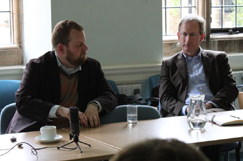
Glenn during discussion.
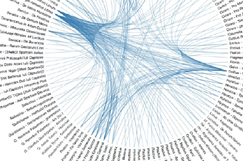
Visualizing influence.
As a supplement to this ‘distant’ reading, Glenn went on to demonstrate the potential of the latest machine-learning technologies to render significant volumes of transcription meaningful via text mining and the automated creation of patterns, frequencies, statistical models, and other forms of ‘mediated’ or ‘directed’ reading. Glenn distinguished between three kinds of text mining: predictive classification (used to generate new categories from unprocessed texts); comparative classification (used to correct and refine existing categories within processed texts); and similarity (used to measure broader similarities between documents and parts of documents, especially in terms of the identification of meaningful borrowing and instances of intertextuality). He then demonstrated each kind of approach within a rich series of examples drawn from his work with the ARTFL Encyclopédie Project, and most recently Electronic Enlightenment, before concluding his analysis by presenting – with caveats – some preliminary radial visualizations of textual influence generated using the D3 JavaScript library.
Kim McLean-Fiander
May 13, 2012
Events, Lectures, Podcasts, Project Updates, Projects and Centres, Websites and Databases
Tags: Archives, Bess of Hardwick, Digitization, Editions, England, Gender, Materiality, Sixteenth Century, Women
 Podcast available on the seminar page!
Podcast available on the seminar page!
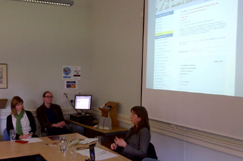
Alison fields questions.
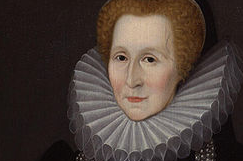
Bess in the 1590s.
Dr Alison Wiggins of the University of Glasgow got our third seminar series off to a brilliant start on 26 April with a sophisticated and thought-provoking presentation on Editing Bess of Hardwick’s Letters Online. As Principal Investigator of the Letters of Bess Hardwick Project (funded by the AHRC), Alison described the benefits and methodological challenges of digitizing this unique Renaissance correspondence, which consists of approximately 245 extant letters (160 to and 85 from Bess) scattered across 18 different repositories spanning a period of nearly 60 years.
Using several examples drawn from the corpus, Alison argued that making all of the letters available in an open-access, fully searchable online edition will enable scholars to pursue a wide range of linguistic, sociological, and historical questions, and will allow them to arrive at a much more comprehensive and nuanced understanding of the character of Bess herself, who has been variously depicted as a materialistic virago or as an admirable defender of women’s honour.
 Moving on to more methodological questions, Alison explained that capturing and communicating significant information on the material and visual features of letters, such as the writer’s use of ‘significant space’, paper quality and size, the employment of colourful silk ribbons and flosses, seal choice, and the many varieties of folding, can be particularly difficult in a digital environment, which has a tendency to reify disembodied text at the expense of the letter-object (concerns also raised by Henry Woudhuysen and James Daybell in previous talks). This is a significant problem, since such information is not just antiquarian micro-detail; on the contrary, for contemporary recipients, all of these carefully considered material decisions on the part of the sender conveyed specific social meanings about politeness, deference, and hierarchy which set important parameters for the reception and consumption of a letter’s written content. However, such physical variables and their nuances are not easy to capture faithfully with a simple measurement or colour chart reference in a metadata field. The solutions developed by Alison and her team in the context of the Bess project (such as encoding each of the four recognized kinds of letter-fold − tuck and fold, slit and band, accordion, and sewn − within each letter’s XML to facilitate searching and filtering by plicature and packet type) genuinely move forward thinking in this oft-neglected area and will be of great interest to other digital initiatives.
Moving on to more methodological questions, Alison explained that capturing and communicating significant information on the material and visual features of letters, such as the writer’s use of ‘significant space’, paper quality and size, the employment of colourful silk ribbons and flosses, seal choice, and the many varieties of folding, can be particularly difficult in a digital environment, which has a tendency to reify disembodied text at the expense of the letter-object (concerns also raised by Henry Woudhuysen and James Daybell in previous talks). This is a significant problem, since such information is not just antiquarian micro-detail; on the contrary, for contemporary recipients, all of these carefully considered material decisions on the part of the sender conveyed specific social meanings about politeness, deference, and hierarchy which set important parameters for the reception and consumption of a letter’s written content. However, such physical variables and their nuances are not easy to capture faithfully with a simple measurement or colour chart reference in a metadata field. The solutions developed by Alison and her team in the context of the Bess project (such as encoding each of the four recognized kinds of letter-fold − tuck and fold, slit and band, accordion, and sewn − within each letter’s XML to facilitate searching and filtering by plicature and packet type) genuinely move forward thinking in this oft-neglected area and will be of great interest to other digital initiatives.
Following a brief, appetite-whetting demonstration of the Bess letters alpha software, a lively question and answer session concluded the seminar, which covered such topics as the sociolinguistic significance of employing scribes and the iconographic implications of Bess using her ‘ES’ signature both in letters and as architectural embellishment on her stately home, Hardwick Hall. Broader concerns were also addressed, including the need for digital projects to produce REF-friendly outputs – an increasingly important theme – and ways of ensuring the preservation and accessibility of online resources long after project funding comes to an end. The soon-to-be-released Bess of Hardwick Letters Online will include annotated transcriptions of all of the letters and images of many, as well as articles and podcasts offering further contextual analyses of the correspondence. For news about its release date, stay tuned!
Seminars take place in the Faculty of History on George Street on Thursdays at 3pm. For future talks in the series – and to listen to the podcast of Alison’s paper – please see the seminar webpage. All are welcome!
As part of their recent strategic alliance with Queen Mary, University of London, the Centre for the Study of the Renaissance at the University of Warwick has announced two Postdoctoral Research Fellowships, one based at Queen Mary and one at Warwick, on the theme of ‘Networks and Information Technologies, 1300-1800’. To form part of the collaborative project ‘Rewiring the Renaissance: Cultural Networks and Information Technologies’, the Fellows will explore modes of communication and networking in the Renaissance period, from letter writing to orality, and develop IT-led modern mechanisms which can capture and analyse the Renaissance communities that were constructed. Projects that explore cultural transmission in any media or European language are welcome; in addition, the Queen Mary Postdoctoral Research Fellow will be expected to have the skills that will allow for an interrogation of the ways in which we communicate historical information in a digital world.
The deadline for applications is Friday, 11 May 2012. For background information on the collaboration, further details about the two posts, and to apply, please visit the project webpage. Please send informal enquiries to Dr Penny Roberts.



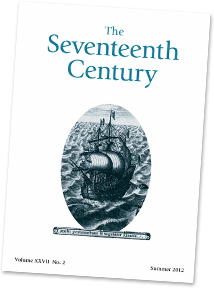








 Moving on to more methodological questions, Alison explained that capturing and communicating significant information on the material and visual features of letters, such as the writer’s use of ‘significant space’, paper quality and size, the employment of colourful silk ribbons and flosses, seal choice, and the many varieties of folding, can be particularly difficult in a digital environment, which has a tendency to reify disembodied text at the expense of the letter-object (concerns also raised by
Moving on to more methodological questions, Alison explained that capturing and communicating significant information on the material and visual features of letters, such as the writer’s use of ‘significant space’, paper quality and size, the employment of colourful silk ribbons and flosses, seal choice, and the many varieties of folding, can be particularly difficult in a digital environment, which has a tendency to reify disembodied text at the expense of the letter-object (concerns also raised by 
 Join
Join 